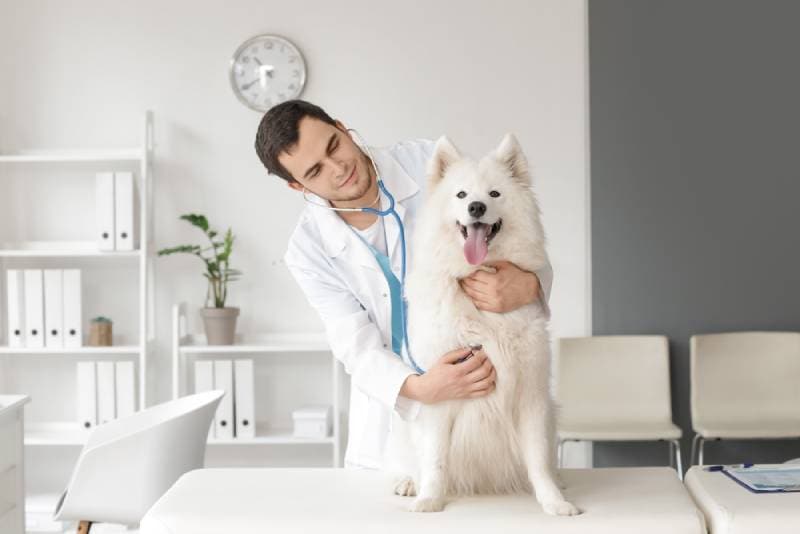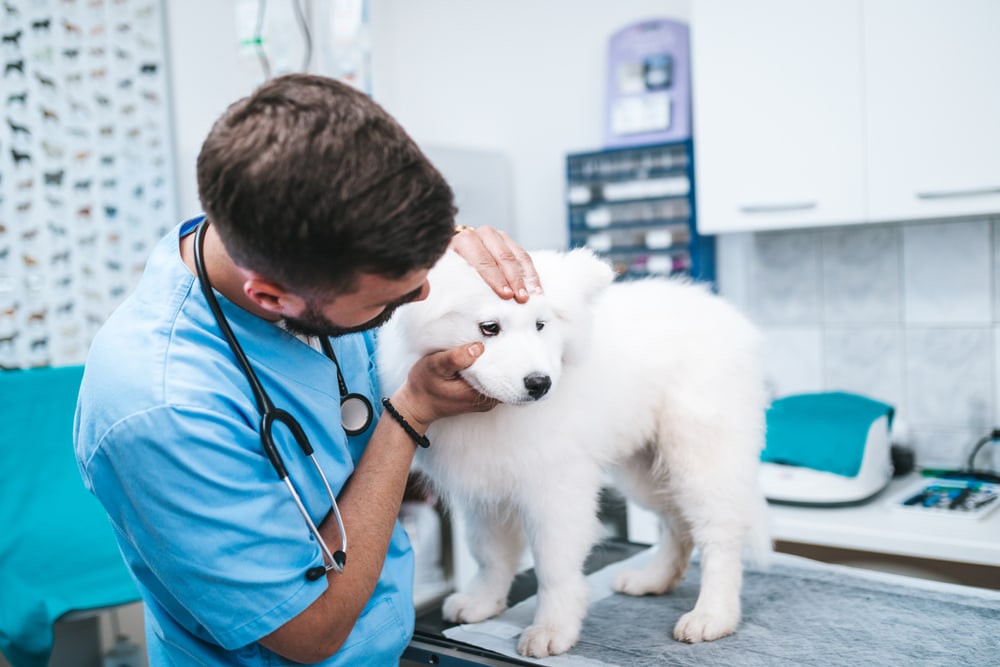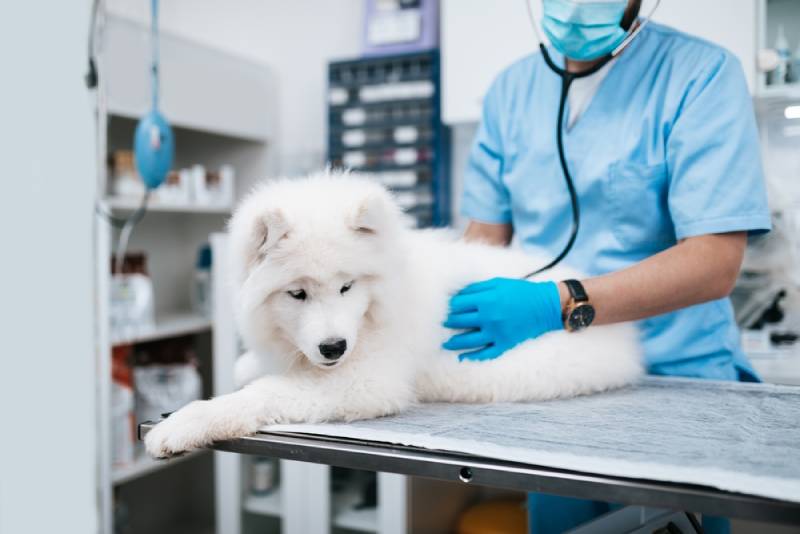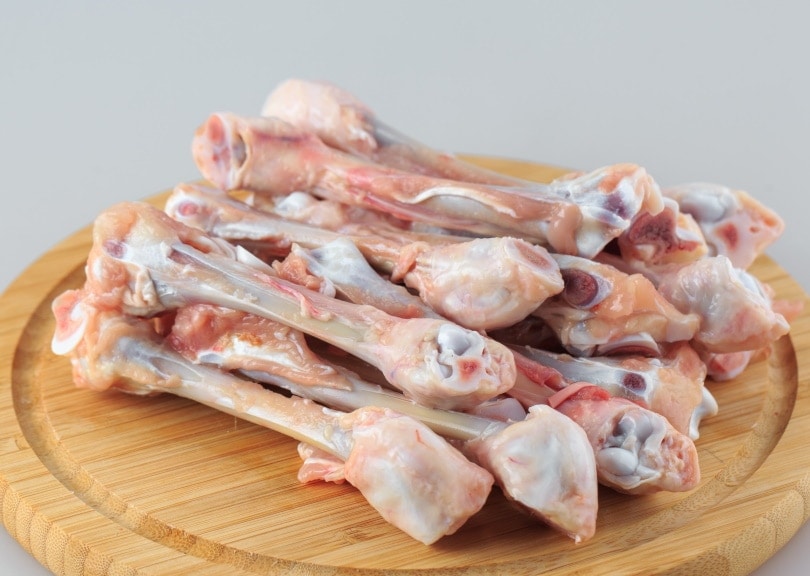5 Samoyed Health Issues To Be Aware Of (Vet Answer)
Updated on

Samoyeds are a gorgeous dog breed known for their silly, mischievous personalities, thick white coat, and eternal smile. This popular breed can be working dogs or fantastic house pets, with only a limited list of health issues. Some of their body systems are more at risk of diseases than others and we’ve gathered a list of some of the common health concerns of Samoyeds that you need to know.
The 5 Samoyed Health Issues
1. Eyes
Samoyeds are prone to many of the most common eye conditions.
- Cataracts
- Corneal dystrophy
- Distichiasis
- Glaucoma
- Keratoconjunctivitis sicca
- Oculoskeletal dysplasia
- Persistent pupillary membrane
- Retinal atrophy
- Retinal dysplasia
- Uveodermatologic syndrome
Some of those diseases are likely to cause blindness, like retinal conditions, while others, like persistent pupillary membranes, rarely do. Chronic treatment is required for some, like glaucoma; others have no treatment options, like the two retinal conditions. Uveodermatologic syndrome is an autoimmune disorder affecting the eyes and skin and can affect vision. Treatment consists of immunosuppressives targeting the dog’s entire immune system rather than just the eyes.

2. Sebaceous Adenitis
Hair follicles have an attached gland, the sebaceous gland, that provides oils for soft, healthy hair growth. Samoyeds with sebaceous adenitis are experiencing inflammation of those sebaceous glands, which leads to a potentially itchy, brittle, dry hair coat that can progress to hair loss.
Treatment consists of immunosuppressive medication to lower inflammation at any intact glands, along with topical products and supplements to support the hair coat and also lower inflammation. Unfortunately, this inflammation can kill the sebaceous glands, so not all dogs can return to a normal hair coat with treatment if their glands are already dead.
3. Hypomyelinogenesis (Shaking Puppy Syndrome)
Hypomyelinogenesis is a rare condition in dogs, but Samoyeds are one of the breeds it occurs most frequently in. This is a genetic, congenital disease in which the myelination that typically surrounds the nerves of the central nervous system to keep them operating optimally is present in lower amounts. Myelin forms a sheath around nerves to allow them to conduct electrical impulses.
Samoyeds with hypomyelinogenesis show signs of tremors, unsteady gait, wobbling, high stepping, wide stances, bunny hopping movements, and limb jerking while awake, especially when excited, but not while sleeping, which starts at a very young age and can be fatal. Due to the occurrence in newborns, it is often referred to as shaking puppy syndrome, and in Samoyeds, this typically only affects male puppies.

4. Samoyed Hereditary Nephritis
This is another disease of Samoyed puppies. This genetic condition causes loss of protein in the kidney in these puppies. Proteins are large molecules in the blood, such as clotting proteins, that the kidney is supposed to work as a filter for that keeps them in the blood. Proteins that pass through the kidney with this disease damage the kidney over time, leading to kidney failure.
Treatment for SHN focuses on supportive care to help prolong the life of the kidneys, but most Samoyeds with this disease will pass by middle age.
5. Heart
Samoyeds suffer from three potential heart conditions: atrial septal defect, aortic stenosis, and pulmonic stenosis. These are all congenital heart conditions that a Samoyed puppy may be born with. Treatment depends upon the severity and conditions a puppy was born with, as they can have more than one, and surgery is usually the treatment of choice when indicated.
Trying to correct these abnormalities can sometimes cause new problems to arise, so the prognosis depends on how badly they already affect the puppy’s heart.

Frequently Asked Questions (FAQs)
Are Samoyeds a healthy breed?
Samoyeds are generally considered a well-bred, healthy breed. Even with the significance of some of the health conditions listed above, they are not overwhelmingly common and mostly occur within only two body systems.
What’s another name for Samoyed hereditary nephritis?
This may also be called Samoyed hereditary glomerulopathy. This is because the glomerulus is the filter area of the kidney which is abnormal and allows the passage of proteins in affected dogs.
How can I tell if my Samoyed has these health issues?
Since these are genetic conditions, several of them can be screened through genetic testing. It is best to check in with the breeder and/or your veterinarian before and after bringing a Samoyed home so you know if you need to pursue any testing.
Final Thoughts
Eye diseases and congenital heart defects are persistent problems for Samoyeds, along with a couple of other diseases. They are a fantastic breed that lives long, healthy lives. Welcoming a Samoyed into your home should include genetic screening on important conditions and screening bloodwork and potentially X-rays to screen for evidence of some diseases, but this is common with many other dog breeds as well.
If you notice any abnormal signs in your Samoyed, it is best to bring them to a veterinarian to be checked.
Featured Image Credit: Pixel-Shot, Shutterstock














